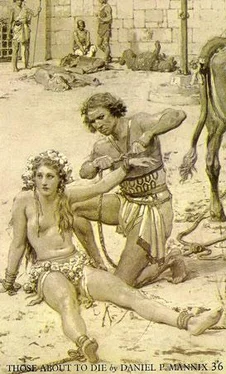Daniel Mannix - Those About to Die
Здесь есть возможность читать онлайн «Daniel Mannix - Those About to Die» весь текст электронной книги совершенно бесплатно (целиком полную версию без сокращений). В некоторых случаях можно слушать аудио, скачать через торрент в формате fb2 и присутствует краткое содержание. Год выпуска: 1972, ISBN: 1972, Издательство: Mayflower Books Ltd, Жанр: Исторические приключения, на английском языке. Описание произведения, (предисловие) а так же отзывы посетителей доступны на портале библиотеки ЛибКат.
- Название:Those About to Die
- Автор:
- Издательство:Mayflower Books Ltd
- Жанр:
- Год:1972
- ISBN:978-0583121347
- Рейтинг книги:4 / 5. Голосов: 1
-
Избранное:Добавить в избранное
- Отзывы:
-
Ваша оценка:
- 80
- 1
- 2
- 3
- 4
- 5
Those About to Die: краткое содержание, описание и аннотация
Предлагаем к чтению аннотацию, описание, краткое содержание или предисловие (зависит от того, что написал сам автор книги «Those About to Die»). Если вы не нашли необходимую информацию о книге — напишите в комментариях, мы постараемся отыскать её.
Those About to Die — читать онлайн бесплатно полную книгу (весь текст) целиком
Ниже представлен текст книги, разбитый по страницам. Система сохранения места последней прочитанной страницы, позволяет с удобством читать онлайн бесплатно книгу «Those About to Die», без необходимости каждый раз заново искать на чём Вы остановились. Поставьте закладку, и сможете в любой момент перейти на страницу, на которой закончили чтение.
Интервал:
Закладка:
"Poor fellow, what good has it done you to learn to obey a master weaker than yourself, to learn to leave and re-enter your cage on command, to retrieve your quarry for him and even let him put his hand between your jaws? Once you were the terror of the arena and all the other lions shrank back when you marched past. You died fighting, as bravely as any soldier, and even when you knew that you'd received your death wound, you waited with open jaws for the enemy to finish you off.
"Yet know that the people and the senate mourn for you as though you were a famous gladiator and among thousands of other beasts gathered from Scythia to the banks of the Rhine, Cesar's face only fell when you died although it was nothing but another lion lost"
There are accounts of trained lions being used to pull chariots for the editor of the games, and also several cases when trained lions saved their bestiarii masters from wild animals. Then, of course, there's the famous story of Androcles and the lion. Androcles was a Greek slave who escaped from his master and while wandering around the desert, met a lion with a thorn in his foot. Androcles pulled out the thorn and the lion never forgot the kind deed. Later, the lion was captured and shipped to the arena and so was Androcles. The starved lion was turned loose in the arena to devour the escaped slave but the lion refused to harm the man who had befriended him. A leopard was turned loose to do the job and the lion killed the leopard to defend his pal. The crowd demanded that both Androcles and the lion be freed. Afterwards, Androcles made a living by exhibiting the lion in taverns. Gellius and Aelian both swear to the truth of this story (it happened during the reign of Claudius) so I'll believe it. Ordinarily, I'd have my doubts. Anyhow, it's one of the best authenticated legends in history.
What happened to Carpophorus? I don't know so I'll invent an ending suitable for this strange man.
A wealthy noblewoman asked Carpophorus to bring one of his trained jackasses to her room at night, promising him a fabulous sum of money. Carpophorus naturally complied. The lady had made elaborate preparations for the event; four eunuchs had placed a feather bed on the floor, covered with Tyrian purple cloth embroidered in gold, and had arranged soft pillows at one end. The lady instructed Carpophorus to lead the jackass to the bed, get him to lie down, and then with her own hands rubbed him with oil of balsam. When the preparations were complete, Carpophorus was ordered to leave the room and return the next morning. This performance is described in great detail by Apuleius in "The Golden Ass."
The lady demanded the jackass's services so often that Carpophorus was afraid that she might kill herself, but after a few weeks his only concern was that she might totally exhaust the valuable animal. Still, he made such a fortune from the business that he was able to purchase a genuine unicorn's horn. Of course, Carpophorus knew all about the oryx-unicorns used in the arena, but this horn was different. It was pure ivory and over seven feet long. There were only a few of these horns in Rome and they were enormously valuable because if poisoned wine were served in a cup made of a unicorn's horn, the poison would bubble and betray its presence. Carpophorus suspected that these horns were faked in some way, but after carefully examining his purchase he became convinced that it was real ivory and did not come from any known animal. The bestiarius' ambition was to find a unicorn and exhibit it in the arena.
Unicorns were supposed to be tropical animals, but Carpophorus discovered that these horns were imported from the Baltic. This, he decided, explained why the Roman animal catchers in Asia and Africa had never gotten any unicorns. He managed to scrape up acquaintance with the crew of a Viking ship that had come to Ostia to trade and do a little piracy on the side during the voyage home. The Vikings had some broken pieces of unicorn horns with them and Carpophorus was able to get one member of the crew drunk at Chilo's tavern. The sailor told him that the horn came from a great fish which fishermen occasionally caught in their nets. The Vikings called it a narwhal. The fish might be called a sea unicorn for it had one long horn growing from the tip of its nose.
Carpophorus didn't swallow this yarn. The horn was ivory and fish didn't grow ivory. Still, he thought that unicorns might sometimes swim rivers and be caught in nets so that was how the legend started. He travelled to the Baltic with a "negotiator ursorum," a bear-catcher, but was unable to get any unicorns. But he got something almost as valuable— three great white bears unlike any he had ever seen before. These bears came in on icebergs near Ultima Thule, the last outpost of land to the north. Today we call it Iceland.
Carpophorus had the crazy idea that these bears must come from some great land lying to the west, for surely they could not spend all their lives on the floating icebergs. On his way back with the bears, he advanced this theory to a young centurion who was in charge of one of the frontier forts in Scotland built to keep the Picts and Scots from raiding down into Roman Britain.
"There is no land to the west," the centurion told him confidently.
"How do you know?" the bestiarius demanded.
"Because if there were, this damn government would have us legionnaires over there policing the place," said the centurion downing a cup of strong wine.
The bears made a great hit in the arena. The Roman writer Calpurnius describes how the arena was flooded and the bears dove into the water and fought seals. (Polar bears were exhibited in the arena, but at what period is uncertain.) But when the time came for the next act, the bears couldn't be moved. They were still eating the seals, and polar bears are mean animals to handle at the best of times.
The emperor motioned to the archers to kill the beasts for the shows ran on a strict time schedule. Carpophorus refused to see his precious bears killed. He plunged into the knee-deep water, and tried to drive out the bears with his flail. Hampered by the water, he could not avoid the animals' angry rushes. So he died, as did most of his profession, under the teeth and claws of his savage wards. The Romans never realized that they held in their hands the clue to the discovery of a great new world.
CHAPTER THIRTEEN
You may wonder where the Romans got all the animals they used in the games. You'll wonder more after reading a few statistics. Trajan gave one set of games that lasted 122 days during which eleven thousand people and ten thousand animals were killed. Titus had five thousand wild animals and four thousand domestic animals killed during the one hundred-day show to celebrate the opening of the Colosseum. In 249 a.d., Philip celebrated the one thousandth anniversary of the founding of Rome by giving games in which the following were killed: one thousand pairs of gladiators, thirty-two elephants, ten tigers, sixty lions, thirty leopards, ten hyenas, ten giraffes, twenty wild asses, forty wild horses, ten zebras, six hippos and one rhino (Rome and the Romans, by Showerman).
Statistics in themselves don't mean too much so let's take some specific examples. The Emperor Commodus killed five hippopotami himself one day in the arena, shooting arrows from the royal box. Hippos were fairly common in the arena as this and other accounts show. After the Roman Empire fell, the next hippo to reach Europe was in 1850. A whole army division had to be used to capture the animal. Getting the hippo from the White Nile to Cairo took five months. The hippo spent the winter in Cairo and then went on to England in a tank containing four hundred gallons of water to keep it cool. Yet the Romans imported hippos wholesale for their games; in fact they actually exterminated the hippos in the Egyptian Nile. The Romans imported both the African and the Indian rhinoceros, and even the most ignorant members of the crowd could distinguish between the two beasts readily. Mosaics showing the capture of an Indian rhino have recently been uncovered in Sicily. The next Indian rhino to reach Europe was in 1515. Today, there are only six of them in captivity.
Читать дальшеИнтервал:
Закладка:
Похожие книги на «Those About to Die»
Представляем Вашему вниманию похожие книги на «Those About to Die» списком для выбора. Мы отобрали схожую по названию и смыслу литературу в надежде предоставить читателям больше вариантов отыскать новые, интересные, ещё непрочитанные произведения.
Обсуждение, отзывы о книге «Those About to Die» и просто собственные мнения читателей. Оставьте ваши комментарии, напишите, что Вы думаете о произведении, его смысле или главных героях. Укажите что конкретно понравилось, а что нет, и почему Вы так считаете.












